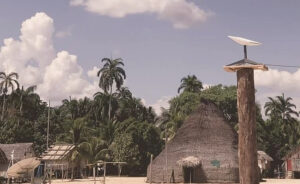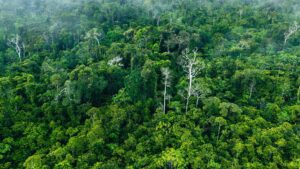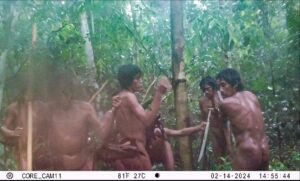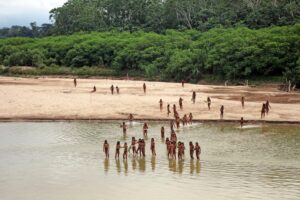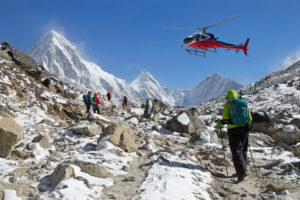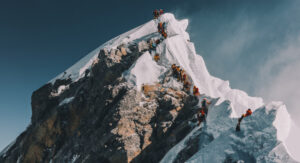Of all the towns and cities I have passed, I can confidently say that Amaturá wins hands down for having the most stunning view of the Solimões river. It is a small, tranquil city, from where I can see the meeting of the dark waters of the Rio Amaturá with the contrasting lighter Solimões (Amazon river). The plaza has a large, blue and white colonial church overlooking the river banks, and I see that many of the people here seem to be Peruvian/Ticuna looking. It looks and feels very different from all the other places I have passed so far. Peru is in my sights.
The traverse
Leaving Juruá was incredibly difficult for me. I was still quite weak and had lost all the weight I had initially gained there after having no appetite for over a week when I had a fever. The thought of 35 days crossing remote uncharted rainforest to reach Amatura was scary. But leave we did.
My pack was more than half my body weight now, and the first 3 days were uncomfortable to put it mildly. I had carefully planned a route I hoped would avoid rivers and low-lying areas, but to my surprise some sections of higher plateau jungle have permanently flooded areas with strange tangled plants and swamps with new (to me) species of tree growing there.
Fifteen days after leaving Rio Juruá and crossing this surprisingly different and challenging terrain, we finally reached the river Rozhino and a tiny, beautiful community I had spotted on Google Earth. There we found a vast number of fruit trees and Brazil nut trees, but to our dismay, not a single human being. The residents were away, probably all off to the distant city of Jutaí for the weekend. Fortunately, luck was on our side once more, and the single canoe that passed was driven by a very old fisherman who promptly gave us a lift about 15 kilometers downriver to another community, where we could get much-needed supplies, re-charge our batteries and our weary bodies. “You’ve just walked from where?” exclaimed the old man. “I don’t believe it!” It is a comment we are used to by now, and we just nod and smile. Everaldo and I know that since leaving Tefé, we have probably walked through vast sections of uncharted rainforest which conceivably no other human being has seen. It is an amazing thought.
After a few days rest we left the security & comfort of the friendly Rio Riozinho community re-energised & re-supplied to head for the Rio Jutai – for me, representing the last big tributary of the Brazilian Amazon. Six days later, after a significant diversion to avoid huge swathes of deeply flooded várzea (flooded forest) we arrived at a small community overlooking the stunningly beautiful Rio Jutai, in high flood and fast flowing. It is times like this when I fervently wish I had a drone to film the views of landscapes, flora and fauna never captured before. I know the drones were available back in Manaus, but the expense was something I simply could not afford (if any potential sponsors out there would like me to share the views, perhaps they could get a pocket DJI Mavic Air out to me!).
The little community on the Rio Jutaí where we hoped to re-supply for the next leg was unfortunately short of food and didn’t have anything to sell us apart from farinha, but we managed to order some from another community further down river. Whilst waiting myself and Everaldo as planned returned 22K back upriver in a borrowed canoe to where we had initially reached the Juati walking then i would swim back again. (We had previously paddled this 22K section down the Rio Jutai in our packrafts to get to the community and to dry higher ground and next point of walking before night fall.) After swimming 18km, I was amazed to find that two members of the local community spontaneously decided to join me for the last 4km. They had been working collecting Açai, so perhaps a quick dip was just what they needed! As we neared the community, we found that everyone had turned out to watch the mad gringo (and their friends) in great amusement from the banks, with Everaldo filming from the little wooden canoe. Another memorable day to add to many.
We got to know the community a bit more whilst waiting for the re-supply, and I filmed Francisco, collecting and making Açai (which we ate literally by the bucket load). I was invited to go collecting Brazil nuts, and Everaldo helped Francisco catch fish. We also accompanied Fransisco to another community downriver, where he took his young son to see a doctor as he was very ill with suspected malaria. After a blood test, it was confirmed that little Anderson had indeed contracted malaria (see photo below). The family we stayed with said other people in this and nearby communities had also contracted malaria. They can’t afford to travel the great distance to Manaus to get treatment, so a local man had been trained to test for the disease and administer drugs. Malaria is still one of the biggest health problems globally, although fortunately various organisations are still working on possible solutions to control and possibly eradicate this terrible disease from the planet. This includes Bill Gates, whose Bill Gates Foundation is doing some amazing research. In light of my experiences here, I hope to write a more detailed blog about Malaria soon.
It seems that the Ribeirinho people who occupy most of the river communities are seen as second class citizens and don’t get the same quality of support or respect as the indigenous communities receive, even though they are born here. They appear to have fewer hunting and fishing rights and few rights to clear land for food and to earn a little bit of money. They certainly can face extortionate fines from the powers that be if caught fishing for turtle or certain other types of fish or animals, even if only for their own consumption. Such fines are far beyond their meagre resources and these restrictions often mean that young adults leave the tranquil, potentially sustainable communities to seek work in overcrowded cities like Manaus.
Back to the traverse. You would think that Insects, although clearly a minor annoyance and in some cases causing pain (scorpions etc) or illness (mosquitoes), would be unlikely to be capable of causing potentially disastrous expedition-ending catastrophes. And as you become more familiar with the territory, the insect life becomes something you learn to live with and put up with. When I was woken one night by something crawling across my face, I did not – as I might have done a few years ago – scream blue murder and jump out of my hammock. True, I was slightly uncomfortable when I discovered it was a couple of large-headed black ants crawling around. I mean, how on earth did they get into my hammock? Did I forget to close the zip?
No. I had not forgotten to zip up, as I discovered when I turned on my head torch, zipped open my net and looked down. There, to my horror, were were thousands upon thousands of leaf cutter ants, that had clearly been cutting holes in my expensive mosquito net and carrying the bits of material back to their enormous network of nests below ground. I knew immediately that this was not a minor irritation, but a potential disaster. They were cutting holes in everything including my backpack and the thick vinyl food sacks. Although the night was still silent, I swear I could hear the sound of the collective munching.
I jumped down and immediately started clearing them away, lightning a fire below my hammock and eventually getting rid of them all, but the rising equatorial sunlight revealed at least 200 holes in my net and more in my other kit including my clothing.
“It’s very lucky you woke up,” said Everaldo (who I was unfairly indignant to find had got away with only three holes in his net) “Otherwise they would have cleared everything in sight including the backpacks, bags, food, boots, pack-rafts, cash and documents.” He smiled. “Mind you,” he said. “You´d have woken up when they chewed through the cord holding the hammocks up.”
We managed to laugh about the event the next day, but the problem remained of how to repair the damage. Luckily, we were only two days away from the Rio Jutaí and another community. There, I was able to sew and patch up the damage enough to reach the city of Amaturá.
Sadly, my walking companion Everaldo now has to return home to his family. I know he would like to continue, but he has commitments and things to resolve in his home town of Berurí on the Rio Purus. I will be sad to see him go, but my skillset and knowledge have improved greatly thanks to being with him over the last three months, and I am happy to have had his companionship.
I am very careful with planning and keeping things in order, especially when it comes to checking all the kit, improvising when things get lost or broken and keeping to a routine that works when making camp. There are probably 100 or more things to do before we sit down & eat each day, but the effort is worth it, and even when we are over tired I won’t cut corners. I have to be strict with myself, work hard, and then reap the rewards of eating and sleeping in reasonable comfort and making good progress through the rainforest. I will write all about the daily routine including the campsite routine, the kit and food supplies that work well, how we locate the right site to pass the night, the mistakes I have made and the solutions I have come up with if and when I eventually write a book about this journey.
So, – order and progress – is my title for this blog. The phrase is inspired by the famous Brazilian Humanitarian and explorer Cândido Rondon. It was Rondon who led the Roosevelt–Rondon Scientific Expedition along the famous ‘River of Doubt’. He also campaigned against African slavery and helped protect and increase respect for the indigenous peoples. He was a member of the Positivist cult, whose famous motto ‘Ordem e Progresso’ is now part of the Brazilian flag. Rondon also founded the IPS (Indian Protection Service), now known as Funai (The National Indian Foundation). My next leg will take me to Benjamin Constant via São Paulo de Olivença. I will need to seek permission to pass Ticuna communities and reservation areas, and there will be considerable challenges to overcome with all the complex logistics including finding Ticuna guides, getting to the Tres Fronteras border and finally crossing into Peru. Along with my positive thinking and a sense humor, I am resolved to keep at the forefront of my mind the little motivational motto I haveadopted from Rondon and try to retain a state of Ordem e Progresso.
Check original blog – https://www.ascentoftheamazon.com/2018/04/ordem-e-progresso/

Pete Casey – walking the Amazonian jungle!

